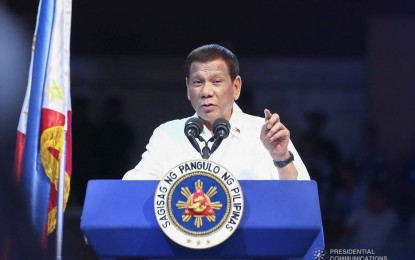
President Rodrigo Duterte. (Presidential Photo)
MANILA -- To free more Filipinos from hunger and achieve food security, President Rodrigo Duterte has created an inter-agency task force on zero hunger.
Duterte signed Executive Order 101 on January 10 creating an inter-agency task force on zero hunger which will be chaired by Cabinet Secretary Karlo Nograles.
Serving as his vice-chairperson is Social Welfare Secretary Joselito Bautista.
Members of the task force include the Agriculture Secretary, Agrarian Reform Secretary, Budget Secretary, Education Secretary, Environment Secretary, Health Secretary, Labor Secretary, Interior Secretary, Trade Secretary, Science Secretary, Communications Secretary, National Economic and Development Authority Director-General, and the Commission on Higher Education Chairperson.
In the EO, Duterte recognized that involuntary hunger, food security, undernutrition, and child wasting, stunting and mortality, continue to be serious concerns in the country.
“There is a need to carefully coordinate, rationalize, monitor and assess the efforts of concerned government agencies and instrumentalities to ensure a whole-of-government approach to eradicating hunger and achieving food security,” Duterte said.
The task force will be assigned to formulate a National Food Policy (NFP), which will outline national priorities based on a comprehensive understanding of the problem of hunger and related issues, and will provide a roadmap for achieving zero hunger, taking into consideration existing laws and issuances, as well as international law and treaty obligations.
Under the NFP, initiatives for ending hunger, achieving food security, improving nutrition, and promoting sustainable agriculture will be identified.
It will coordinate and rationalize the efforts of concerned government agencies and instrumentalities to ensure a “whole-of-government” approach to attaining zero hunger and at the same time evaluate, through the identification of key performance indicators, the government's progress in ending hunger, achieving food security, improving nutrition, and promoting sustainable agriculture.
Technical working groups from among its member-agencies will also be formed to address particular concerns relative to the implementation of this Order.
Finally, the task force will also prepare and submit to the President annual reports on the state of hunger, food security, nutrition and agricultural production in the country, as well as the task force's initiatives and recommendations.
Support and assistance of other government agencies and instrumentalities may also be sought by the task force. Meanwhile, local government units are enjoined to render necessary assistance to the task force.
Initial funding requirements for the implementation of this order will be charged against the current appropriations of the member-agencies of the task force.
However, budgetary requirements for the succeeding years will be included in the annual budget proposals of the concerned agencies.
The order takes effect immediately.
Based on the third quarter of 2019 Social Weather Stations (SWS) survey results fielded from Sept. 27 to 30, 2019, 9.1 percent or an estimated 2.3 million families experienced involuntary hunger at least once in the past three months.
The figure is lower than the 10 percent or an estimated 2.5 million in June 2019 and 9.5 percent or about 2.3 million families in March 2019.
Nograles expressed hope that fewer Filipinos will suffer from hunger with programs like the Enhanced Partnership Against Hunger and Poverty (EPAHP), an initiative to help mitigate hunger, ensure food and nutrition security, and reduce poverty in urban and rural communities, including marginalized communities.
Agencies which are a part of EPAHP are the Department of Social Welfare and Development, Department of Agrarian Reform, Department of Agriculture, the Department of the Interior and Local Government, Department of Education, Department of Health, Department of Science and Technology, Department of Trade and Industry, National Anti-Poverty Commission, National Irrigation Administration, and Landbank. (PNA)
